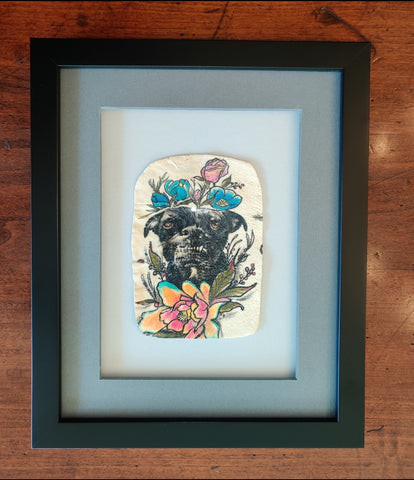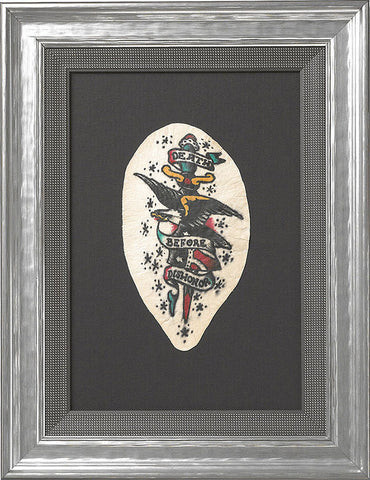Are you curious about the intersection of body art and mortuary science? At tattooat.com, we delve into whether embalmers can have tattoos, examining the perceptions, regulations, and acceptance of tattoos within the funeral industry. Discover how personal expression through ink can coexist with this solemn profession, influencing both the wearer and the families they serve. Whether you’re considering a career in mortuary science or simply intrigued by the blend of tradition and modernity, join us as we explore the evolving landscape of body modification and professional standards.
1. What Are the Perceptions of Tattoos in the Mortuary Profession?
The perceptions of tattoos in the mortuary profession are evolving, but generally, tattoos should be discreet and not offensive to the families served. Traditionally, the funeral industry held conservative views on body modifications, but with changing societal norms, attitudes are becoming more accepting. The key is to maintain a professional appearance that respects the bereaved and upholds the dignity of the deceased.
1.1 How Have Societal Norms Influenced Tattoo Acceptance?
Societal norms have significantly influenced tattoo acceptance across various professions, including mortuary science. As tattoos become more mainstream and visible in everyday life, industries once considered conservative are adapting to reflect these changes. This shift is largely driven by younger generations entering the workforce, who view tattoos as a form of personal expression rather than a sign of rebellion. According to a 2023 study by the Pew Research Center, approximately 32% of adults in the U.S. have at least one tattoo, indicating a growing acceptance of body art in general society. This widespread acceptance has paved the way for more lenient attitudes in professional settings, including the funeral industry.
1.2 What Are the Traditional Views of Body Modifications in the Funeral Industry?
Traditional views of body modifications in the funeral industry have been quite conservative, primarily due to the profession’s focus on respect, solemnity, and the comfort of grieving families. For many years, any visible tattoos or piercings were seen as unprofessional and potentially distracting during a sensitive time. Funeral directors and embalmers were expected to maintain a neutral and unassuming appearance to avoid causing any additional stress or discomfort to the bereaved. These traditional views were deeply rooted in cultural norms that associated tattoos with non-conformity and a lack of professionalism. However, as younger generations enter the field and societal attitudes shift, these views are gradually evolving.
1.3 How Do Employers Balance Personal Expression and Professionalism?
Employers in the mortuary profession balance personal expression and professionalism by implementing guidelines that respect both the individual’s right to self-expression and the need to maintain a dignified and comforting environment for grieving families. Many funeral homes now allow tattoos, provided they are discreet, inoffensive, and easily covered if necessary. Dress codes often include policies on tattoo visibility, advising employees to cover any large or potentially controversial tattoos with clothing or makeup during services. According to a survey conducted by the National Funeral Directors Association (NFDA) in 2024, approximately 60% of funeral homes have updated their dress code policies to address tattoos and piercings, reflecting a move towards greater inclusivity while still upholding professional standards.
2. What Are the Legal and Ethical Considerations for Embalmers with Tattoos?
Legal and ethical considerations for embalmers with tattoos primarily revolve around maintaining professionalism and respecting the cultural sensitivities of the families they serve. There are generally no specific laws prohibiting embalmers from having tattoos, but employers often set guidelines to ensure tattoos do not offend or distract from their duties. Ethically, embalmers must ensure their appearance does not undermine the dignity of the deceased or the grieving process.
2.1 Are There Specific Laws Prohibiting Tattoos in Mortuary Science?
There are generally no specific laws prohibiting tattoos in mortuary science. Regulations typically focus on licensing and professional conduct, leaving employers to set their own standards for appearance. However, if a tattoo is deemed discriminatory or offensive, it could potentially violate workplace harassment laws. According to legal experts at the American Board of Funeral Service Education (ABFSE), the key is whether the tattoo disrupts the workplace or infringes upon the rights of others.
2.2 How Do Tattoo Policies Vary Among Funeral Homes?
Tattoo policies vary significantly among funeral homes, ranging from strict bans on visible tattoos to more lenient guidelines that allow discreet tattoos. Some funeral homes, particularly those with a long-standing tradition of conservatism, may require all tattoos to be covered at all times. Others may permit small, non-offensive tattoos to be visible, as long as they do not detract from the professional image. Factors such as the funeral home’s location, clientele, and management philosophy all play a role in shaping these policies. For instance, a funeral home in a more urban, progressive area may have more relaxed tattoo policies compared to one in a rural, conservative community.
2.3 What Ethical Standards Must Embalmers Uphold Regarding Appearance?
Embalmers must uphold high ethical standards regarding appearance, ensuring that their attire and grooming reflect respect, dignity, and professionalism. This includes maintaining cleanliness, wearing appropriate attire (often a suit or professional dress), and ensuring that personal appearance does not distract from the solemnity of the service. Tattoos, if visible, should not be offensive, discriminatory, or overly distracting. According to the Academy of Professional Funeral Service Practice (APFSP), embalmers should always prioritize the comfort and emotional well-being of the bereaved, and their appearance should support this goal.
3. How Do Tattoos Impact the Embalmer’s Interactions with Families?
Tattoos can impact an embalmer’s interactions with families in various ways, depending on the nature of the tattoo and the family’s perceptions. While some families may not be bothered by tattoos or even find them relatable, others may view them as unprofessional or disrespectful. The key for embalmers is to be mindful of their appearance and to approach interactions with sensitivity and empathy.
3.1 How Can Embalmers Ensure Their Tattoos Do Not Offend Grieving Families?
Embalmers can ensure their tattoos do not offend grieving families by exercising discretion and professionalism in their appearance. This includes covering large or potentially offensive tattoos with clothing or makeup, especially during interactions with families. They should also be mindful of the cultural and personal sensitivities of the bereaved, adjusting their approach as needed to ensure comfort and respect. According to experts in grief counseling, the focus should always be on providing support and compassion, and any personal expression should not detract from this primary goal.
3.2 Do Cultural Differences Affect Acceptance of Tattoos in Funeral Settings?
Cultural differences significantly affect the acceptance of tattoos in funeral settings. In some cultures, tattoos may be viewed as a sign of disrespect or non-conformity, while in others, they may be considered a form of personal expression or cultural identity. For example, certain indigenous cultures have long traditions of tattooing that are deeply intertwined with their spiritual beliefs and social practices. Funeral homes serving diverse communities must be aware of these cultural nuances and adapt their policies and practices accordingly. Understanding and respecting these differences is crucial for providing culturally sensitive and appropriate care to grieving families.
3.3 What Strategies Can Embalmers Use to Build Trust with Families?
Embalmers can use several strategies to build trust with families, regardless of their personal appearance. These include:
- Professionalism: Maintaining a professional demeanor at all times, including appropriate attire, punctuality, and respectful communication.
- Empathy: Demonstrating genuine empathy and compassion towards grieving families, acknowledging their loss and offering support.
- Transparency: Clearly explaining the embalming process and answering any questions families may have with honesty and transparency.
- Respect: Showing respect for the deceased and their family’s wishes, ensuring that all arrangements are handled with dignity and care.
- Active Listening: Paying close attention to the family’s concerns and preferences, and tailoring their services to meet their specific needs.
4. What Are the Best Practices for Tattoo Display in the Workplace?
Best practices for tattoo display in the workplace involve finding a balance between personal expression and professional image. This includes setting clear guidelines on the types of tattoos that are acceptable, ensuring that offensive or discriminatory tattoos are covered, and allowing employees to express themselves while maintaining a respectful environment for clients and colleagues.
4.1 How Should Funeral Homes Create Clear Tattoo Policies?
Funeral homes should create clear tattoo policies by first defining what constitutes an acceptable and unacceptable tattoo in the workplace. The policy should specify that tattoos must not be offensive, discriminatory, or disruptive to the professional environment. It should also outline guidelines for tattoo visibility, such as requiring large or controversial tattoos to be covered with clothing or makeup. The policy should be communicated clearly to all employees and enforced consistently. According to HR experts specializing in funeral home management, involving employees in the policy development process can help ensure buy-in and reduce potential conflicts.
4.2 What Types of Tattoos Are Generally Considered Unacceptable?
Generally, tattoos considered unacceptable in professional settings, including funeral homes, include those that are:
- Offensive: Tattoos depicting violence, hate speech, or explicit content.
- Discriminatory: Tattoos that promote discrimination based on race, religion, gender, sexual orientation, or other protected characteristics.
- Distracting: Tattoos that are excessively large, colorful, or placed in highly visible areas that may detract from the professional image.
- Inappropriate: Tattoos that are inconsistent with the values and mission of the organization or that may undermine public trust.
4.3 How Can Employers Ensure Consistent Enforcement of Tattoo Policies?
Employers can ensure consistent enforcement of tattoo policies by:
- Training: Providing training to managers and supervisors on how to interpret and enforce the policy fairly and consistently.
- Documentation: Documenting all instances of policy enforcement, including any warnings or disciplinary actions taken.
- Regular Review: Regularly reviewing the policy to ensure it remains relevant and effective, and making any necessary updates or revisions.
- Open Communication: Fostering open communication between employees and management, encouraging employees to raise any concerns or questions they may have about the policy.
- Fairness: Applying the policy consistently to all employees, regardless of their position or personal relationships.
5. How Are Tattoo Acceptance Trends Changing in Other Professions?
Tattoo acceptance trends are changing rapidly in various professions, with many industries becoming more open to visible tattoos as societal attitudes evolve. Fields like healthcare, education, and law enforcement are increasingly recognizing that tattoos do not necessarily reflect an individual’s competence or professionalism. This shift is driven by a growing recognition of the importance of diversity and inclusion in the workplace.
5.1 Which Industries Are Becoming More Accepting of Tattoos?
Several industries are becoming more accepting of tattoos, including:
- Healthcare: Many hospitals and clinics are relaxing their tattoo policies, allowing healthcare professionals to have visible tattoos as long as they are not offensive or distracting.
- Education: Schools and universities are becoming more open to teachers and professors with tattoos, recognizing that body art does not impact their ability to educate students.
- Law Enforcement: Some police departments and law enforcement agencies are easing their restrictions on tattoos, allowing officers to have visible tattoos as long as they are not offensive or gang-related.
- Retail and Hospitality: These industries have generally been more accepting of tattoos, as they often cater to a diverse customer base.
- Tech Industry: Known for its progressive culture, the tech industry often embraces individuality, including tattoos and other forms of self-expression.
5.2 What Factors Are Driving the Shift in Tattoo Acceptance?
Several factors are driving the shift in tattoo acceptance, including:
- Changing Demographics: As younger generations with a higher prevalence of tattoos enter the workforce, industries are adapting to reflect these demographic changes.
- Increased Visibility: The increased visibility of tattoos in mainstream media and popular culture has helped to normalize body art and reduce stigma.
- Focus on Individuality: There is a growing emphasis on individuality and self-expression in society, leading to greater acceptance of diverse forms of personal expression, including tattoos.
- Legal Challenges: Some employees have challenged strict tattoo policies in court, arguing that they are discriminatory or violate their right to self-expression.
- Business Needs: Companies are realizing that strict tattoo policies can limit their ability to attract and retain talented employees, particularly in competitive industries.
5.3 How Can Professionals Navigate Tattoo Stigma in the Workplace?
Professionals can navigate tattoo stigma in the workplace by:
- Professional Conduct: Maintaining a high level of professionalism in their work and interactions with colleagues and clients.
- Communication: Being open and transparent about their tattoos, explaining their significance and addressing any concerns or misconceptions.
- Performance: Focusing on their job performance and demonstrating their competence and value to the organization.
- Advocacy: Advocating for more inclusive tattoo policies in the workplace, educating colleagues and management about the changing attitudes towards body art.
- Cover-Up: Being willing to cover up tattoos if necessary, especially in situations where it may be perceived as disrespectful or unprofessional.
6. How Can Embalmers Use Tattoos to Connect With Clients?
Embalmers can use tattoos as a way to connect with clients by finding common ground and building rapport through shared experiences or interests. Tattoos can serve as a conversation starter, allowing embalmers to relate to clients on a personal level and demonstrate empathy and understanding. However, it is important to approach these interactions with sensitivity and respect, recognizing that not all clients may be receptive to discussing tattoos.
6.1 Can Tattoos Help Embalmers Relate to Younger Generations?
Tattoos can indeed help embalmers relate to younger generations, who are more likely to have tattoos themselves and view them as a form of self-expression. By sharing their own tattoo experiences or simply acknowledging the client’s tattoos, embalmers can establish a connection and build trust with younger clients. This can be particularly helpful in funeral settings, where younger family members may feel uncomfortable or disconnected from traditional funeral practices.
6.2 How Can Embalmers Initiate Tattoo-Related Conversations Respectfully?
Embalmers can initiate tattoo-related conversations respectfully by:
- Observation: Noticing and acknowledging the client’s tattoos in a non-judgmental way.
- Questions: Asking open-ended questions about the client’s tattoos, such as “What inspired you to get that tattoo?” or “Is there a story behind your tattoo?”
- Sharing: Sharing their own tattoo experiences or interests, if appropriate.
- Listening: Listening attentively to the client’s responses and showing genuine interest in their stories.
- Respect: Respecting the client’s boundaries and avoiding intrusive or personal questions.
6.3 What Are the Risks of Discussing Tattoos with Grieving Families?
There are some risks associated with discussing tattoos with grieving families, including:
- Offense: The client may be offended by the embalmer’s interest in their tattoos, particularly if they are in a state of grief or emotional distress.
- Distraction: The conversation may distract from the purpose of the meeting, which is to discuss funeral arrangements and honor the deceased.
- Unprofessionalism: The discussion may be perceived as unprofessional or inappropriate, particularly if the embalmer is overly casual or personal.
- Misunderstanding: The client may misunderstand the embalmer’s intentions, interpreting their interest in tattoos as insensitive or disrespectful.
7. What Are the Future Trends in Tattoo Acceptance and Body Art?
Future trends in tattoo acceptance and body art point towards greater inclusivity and normalization, with tattoos becoming increasingly integrated into mainstream culture and professional settings. Advancements in tattoo technology and techniques are also driving innovation and creativity in the industry, leading to new forms of body art and self-expression.
7.1 How Will Technology Influence Tattoo Art and Acceptance?
Technology will significantly influence tattoo art and acceptance in several ways:
- Precision: Advanced tattoo machines and techniques will allow for greater precision and detail in tattoo designs.
- Customization: Digital design tools and software will enable artists to create highly customized and personalized tattoos.
- Innovation: New technologies, such as 3D-printed tattoos and augmented reality tattoos, will push the boundaries of body art and self-expression.
- Education: Online resources and platforms will provide greater access to tattoo education and training, leading to more skilled and knowledgeable artists.
- Safety: Improved sterilization and safety technologies will reduce the risk of infections and complications associated with tattooing.
7.2 Will More Professions Embrace Visible Tattoos in the Future?
It is likely that more professions will embrace visible tattoos in the future, as societal attitudes continue to evolve and younger generations enter the workforce. Industries that have traditionally been conservative, such as finance and law, may gradually relax their tattoo policies to attract and retain talent. However, certain professions, such as those involving public safety or national security, may continue to have stricter regulations on visible tattoos.
7.3 What New Forms of Body Art Are Emerging?
Several new forms of body art are emerging, including:
- LED Tattoos: Tattoos that incorporate LED lights to create illuminated designs.
- Soundwave Tattoos: Tattoos that visually represent soundwaves, allowing individuals to “hear” their tattoos by scanning them with a smartphone app.
- Scented Tattoos: Tattoos that release a pleasant scent when rubbed or exposed to heat.
- Biometric Tattoos: Tattoos that incorporate biometric sensors to monitor health data, such as heart rate and blood pressure.
- Temporary Tattoos: Advanced temporary tattoos that can last for several weeks or months and can be easily removed without causing pain or scarring.
8. What Resources Are Available for Embalmers Seeking Tattoo Guidance?
For embalmers seeking tattoo guidance, several resources are available to help navigate workplace policies and professional standards. These resources include professional organizations, industry publications, and online forums where embalmers can share experiences and advice.
8.1 Which Professional Organizations Offer Guidance on Appearance Standards?
Several professional organizations offer guidance on appearance standards for embalmers, including:
- The National Funeral Directors Association (NFDA): Provides resources and guidelines on professional conduct and appearance for funeral directors and embalmers.
- The Academy of Professional Funeral Service Practice (APFSP): Offers certification and continuing education programs that emphasize ethical and professional standards.
- The American Board of Funeral Service Education (ABFSE): Sets accreditation standards for funeral service education programs and provides resources on best practices in the industry.
8.2 What Industry Publications Address Tattoo Policies?
Industry publications that address tattoo policies include:
- Funeral Business Advisor: Features articles and advice on managing funeral home operations, including employee policies and appearance standards.
- American Funeral Director: Covers a range of topics related to funeral service, including ethical considerations and professional development.
- The Director: Published by the NFDA, this magazine provides insights and resources for funeral service professionals.
8.3 Where Can Embalmers Find Online Forums for Tattoo Discussions?
Embalmers can find online forums for tattoo discussions on platforms such as:
- Reddit: Subreddits like r/funeralhomes and r/embalming offer discussions on various topics related to the profession, including appearance standards and tattoo policies.
- Facebook Groups: Numerous Facebook groups for funeral service professionals provide a space for sharing experiences and advice.
- LinkedIn: LinkedIn groups for funeral directors and embalmers offer discussions on industry trends and best practices.
9. Tattoo Examples
9.1
 Panda tattoo on preserved skin from Save My Ink Forever
Panda tattoo on preserved skin from Save My Ink Forever
9.2
 Dog tattoo preserved by Save My Ink Forever
Dog tattoo preserved by Save My Ink Forever
9.3
 Save My Ink Forever preserves tattoos of deceased loved ones
Save My Ink Forever preserves tattoos of deceased loved ones
10. Frequently Asked Questions (FAQs) About Tattoos and Embalmers
10.1 Can embalmers have visible tattoos?
Yes, embalmers can have visible tattoos, but it depends on the policies of the funeral home or mortuary they work for. Some employers may require tattoos to be covered, while others may allow them as long as they are not offensive.
10.2 Are there any laws against embalmers having tattoos?
No, there are generally no specific laws against embalmers having tattoos. However, employers can set their own policies regarding appearance and tattoo visibility.
10.3 How do grieving families typically react to embalmers with tattoos?
Reactions from grieving families can vary. Some may not be bothered by tattoos, while others may find them unprofessional or distracting. It’s important for embalmers to be sensitive to the family’s feelings and maintain a professional demeanor.
10.4 What types of tattoos are considered inappropriate for embalmers?
Tattoos that are offensive, discriminatory, or excessively large and distracting are generally considered inappropriate for embalmers.
10.5 How can embalmers ensure their tattoos don’t offend anyone?
Embalmers can ensure their tattoos don’t offend anyone by covering them with clothing or makeup, or by choosing discreet tattoo designs that are not likely to be offensive.
10.6 Do tattoo policies vary between funeral homes?
Yes, tattoo policies can vary significantly between funeral homes, depending on the location, clientele, and management philosophy.
10.7 Are tattoos becoming more accepted in the mortuary profession?
Yes, tattoos are generally becoming more accepted in the mortuary profession, as societal attitudes towards tattoos evolve and younger generations enter the workforce.
10.8 What should an embalmer do if a family member expresses discomfort with their tattoos?
If a family member expresses discomfort with their tattoos, the embalmer should apologize and offer to cover the tattoos or have another staff member assist them.
10.9 Can funeral homes legally enforce tattoo policies?
Yes, funeral homes can legally enforce tattoo policies, as long as they are applied consistently and do not discriminate against protected classes.
10.10 Where can embalmers find more information on tattoo policies in the mortuary profession?
Embalmers can find more information on tattoo policies in the mortuary profession by consulting professional organizations, industry publications, and online forums.
Navigating the world of tattoos and professional careers can be complex, but it’s clear that attitudes are evolving. Whether you’re an embalmer looking for guidance or simply curious about the intersection of body art and mortuary science, tattooat.com is your go-to resource.
Ready to explore more about tattoo designs, artists, and the latest trends? Visit tattooat.com today and discover a wealth of inspiration and information. Find the perfect design, connect with talented artists, and stay informed about all things tattoo-related! Address: 1825 SW Broadway, Portland, OR 97201, United States. Phone: +1 (503) 725-3000. Website: tattooat.com.
